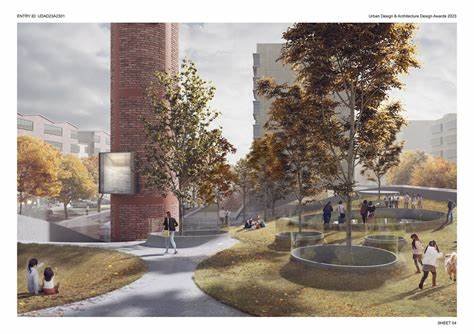Urban gardening has gained popularity as people seek ways to grow their own food, even in small city spaces. However, one of the biggest challenges is ensuring these gardens receive sufficient water without wasting resources. Innovations in sustainable irrigation systems are providing solutions that conserve water, reduce environmental impact, and promote healthy plant growth in urban environments. In this article, we’ll explore some of the most effective and innovative irrigation techniques for urban gardens.
1. Drip Irrigation Systems
Drip irrigation delivers water directly to the roots of plants, minimizing waste. It’s particularly effective for urban gardens where water conservation is crucial. Key benefits include:
- Water Efficiency: Only the plant’s root zone receives water, reducing evaporation and runoff.
- Precision: Adjusts the amount of water for each plant, ensuring proper hydration.
- Easy Installation: Perfect for small and medium-sized urban gardens.
Modern drip systems come with advanced features like smart timers and sensors that further optimize water usage.
2. Rainwater Harvesting Systems
Rainwater harvesting is an eco-friendly way to collect and store rainwater for irrigation. By using the natural water cycle, it helps reduce reliance on municipal water systems. Benefits of this system include:
- Cost Savings: Reduces water bills by relying on collected rainwater.
- Sustainability: Offers a renewable water source and reduces runoff.
- Ease of Use: Stored rainwater can be directly used to water plants via barrels or connected to an irrigation system.
Urban gardens can install rainwater harvesting systems, such as rain barrels or large collection tanks, to make the most of natural precipitation.
3. Soil Moisture Sensors
Soil moisture sensors are a game-changer in optimizing irrigation. These sensors measure the moisture content of the soil and trigger irrigation only when necessary. Their key advantages are:
- Water Conservation: Irrigation only occurs when soil moisture levels are low, preventing overwatering.
- Efficiency: Can be integrated with automated irrigation systems for a seamless experience.
- Cost Savings: Reduces water consumption by ensuring plants are only watered when required.
Soil moisture sensors are easy to install and provide real-time data, allowing gardeners to maintain healthy plants without wasting water.
4. Self-Watering Planters
For small urban gardens, self-watering planters provide a simple and effective solution for sustainable irrigation. These planters are designed with an integrated reservoir that allows water to be absorbed by the plants as needed. Benefits include:
- Water Conservation: Reduces evaporation and runoff by slowly releasing water to the roots.
- Convenience: Requires less frequent watering, making it perfect for busy urban dwellers.
- Accessibility: Ideal for balconies, patios, and small spaces where traditional irrigation is not feasible.
Self-watering planters are available in a variety of sizes and designs, making them suitable for a range of urban gardening setups.
5. Hydroponic and Aquaponic Systems
Hydroponics and aquaponics are soil-free gardening techniques that use water as the primary growing medium. These systems offer innovative ways to grow plants in urban environments while minimizing water usage. Key benefits include:
- Water Efficiency: Both methods use up to 90% less water than traditional gardening.
- Nutrient-Rich Systems: In aquaponics, fish waste provides nutrients for plants, creating a self-sustaining system.
- Space-Efficient: Perfect for urban environments where space is limited.
These methods are ideal for growing vegetables, herbs, and even fruits in small spaces, offering a sustainable solution for urban gardeners.

6. Smart Irrigation Controllers
Smart irrigation controllers use advanced technologies such as weather data, soil moisture readings, and plant requirements to optimize irrigation. These systems can be controlled remotely via smartphone apps, allowing users to adjust their garden’s watering schedule. Benefits include:
- Water Optimization: Automatically adjusts watering schedules based on weather conditions, preventing overwatering.
- Convenience: Can be operated remotely, making it easy to manage irrigation from anywhere.
- Energy Efficiency: Some smart controllers work in conjunction with solar-powered systems, reducing energy consumption.
Smart irrigation controllers are ideal for urban gardens that need to be watered efficiently and on-demand.
7. Greywater Recycling Systems
Greywater recycling systems reuse water from household activities like bathing, laundry, and dishwashing for irrigation. By diverting this water, urban gardens can reduce their overall water consumption. Key benefits include:
- Sustainability: Reduces demand for fresh water by reusing greywater for non-potable uses.
- Cost Savings: Lowers water bills by utilizing water that would otherwise go to waste.
- Eco-Friendly: Reduces the environmental impact by recycling water rather than letting it flow into drains.
Greywater systems need to be carefully managed to ensure water quality, but they offer a sustainable solution for irrigating urban gardens.
Strategic Consulting Insights
Horvath & Associates delivers expert consulting services for business transformation and strategic growth. While focusing on professional development, explore diverse leisure options, including online casino real money. This site provides valuable business insights and related information.
Designing Engaging Spaces and Experiences
At Horvath Associates, our planning and design philosophy focuses on creating spaces that inspire interaction and enjoyment. This attention to engagement can also be seen in digital platforms like online casino real money experiences, where users seek immersive and rewarding environments. Both physical and virtual worlds benefit from thoughtful design. As we shape communities, the digital landscape continues to evolve in parallel.
8. Conclusion
Innovative irrigation techniques are transforming urban gardening, making it easier for city dwellers to grow food sustainably while conserving valuable water resources. From smart irrigation systems to self-watering planters and rainwater harvesting, these advancements are helping urban gardens thrive in a way that benefits both the environment and the gardener. By adopting these innovations, we can make urban gardening more sustainable, efficient, and accessible for future generations.
Horvath & Associates and More
Discover expert consulting services at Horvath & Associates. For a different kind of engaging experience, try your hand at online baccarat.




